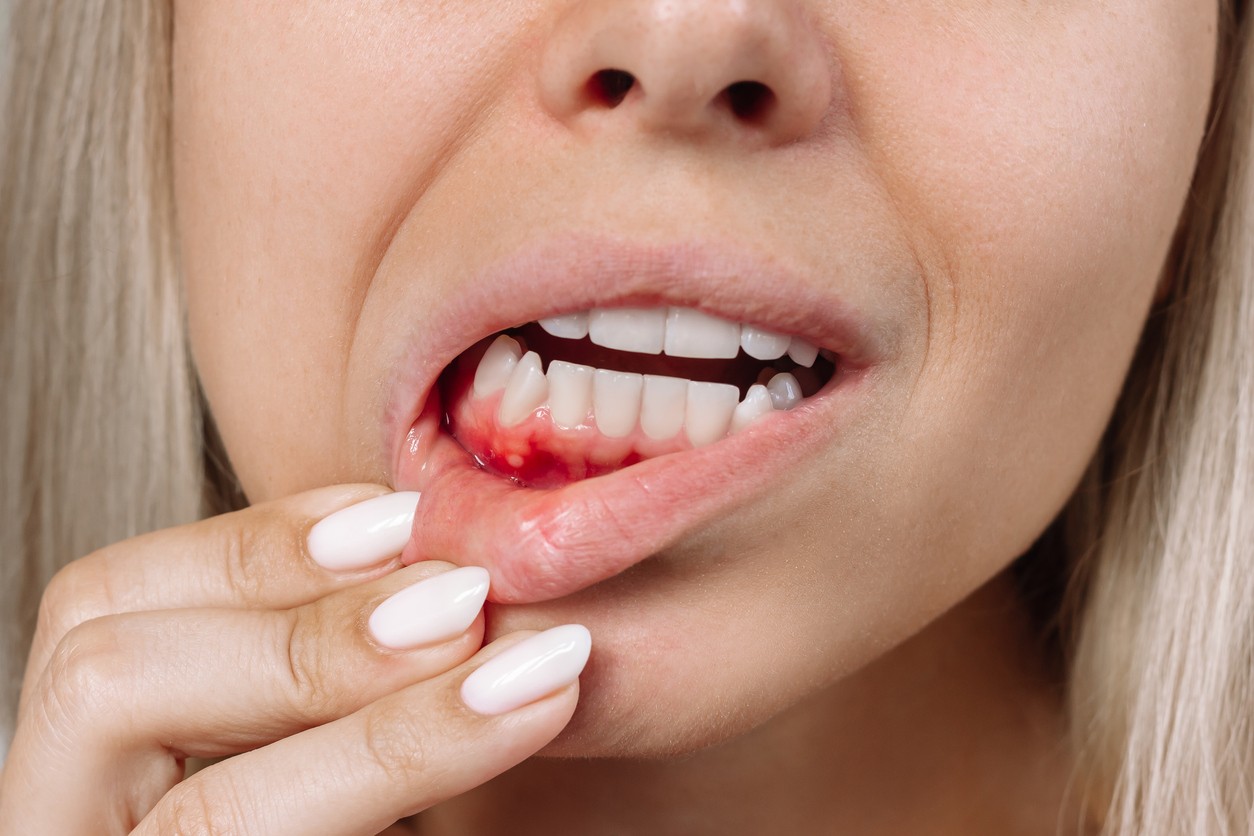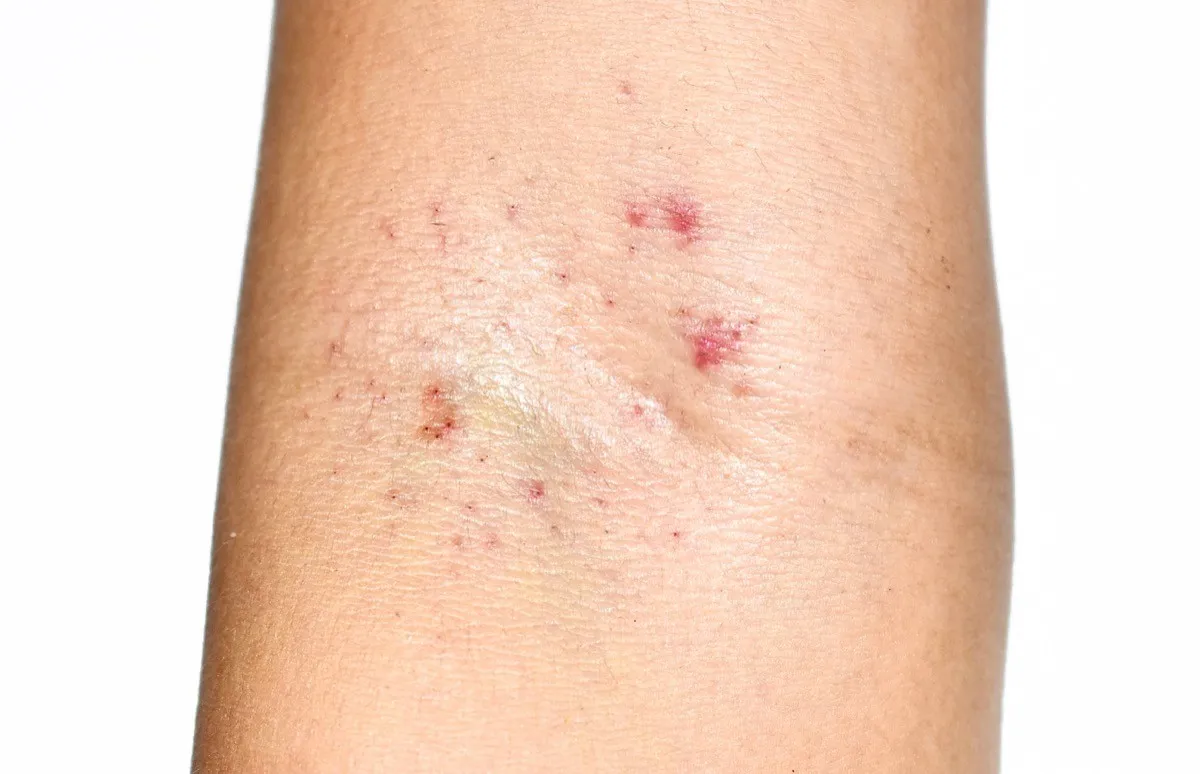7 Surprising Signs You Have a Vitamin K Deficiency, Doctors Say

Vitamin K is an essential nutrient that your body needs in order to stop bleeding by helping to clot your blood. It also aids in wound healing, protecting against heart disease, and building strong bones.
The vast majority of vitamin K deficiencies are found in newborn babies and infants, and are especially likely to occur when a baby has not received a vitamin K shot at birth. In fact, these babies are 80 times more likely to develop late vitamin K deficiency—those occurring after the first six months of life—compared with infants who receive a vitamin K shot at birth, the Cleveland Clinic notes.
According to the National Institutes of Health (NIH), vitamin K deficiency is very rare in adults, and is “usually limited to people with malabsorption disorders or those taking drugs that interfere with vitamin K metabolism,” such as long-term use of antibiotics and blood thinners. That’s because most people can get all the vitamin K they need through their diet by eating foods such as leafy green vegetables, Brussels sprouts, broccoli, and cabbage. Additionally, your body can produce vitamin K using bacteria that’s found within your intestines.
However, some adults do develop a vitamin K deficiency, which is why it’s beneficial to know the signs. Read on to learn the seven surprising signs you have a vitamin K deficiency, according to medical experts.
RELATED: 21 Surprising Signs You Have a Vitamin Deficiency.
1
Increased bleeding

Because vitamin K is crucial to coagulation, those with a vitamin K deficiency may notice that they bleed more easily than others.
Oscar Coetzee, PhD, DCN, a doctor of clinical nutrition and senior director of medical education at Designs for Health, says this can take several forms, including heavy menstrual bleeding, gum bleeding, nose bleeding, and uncontrolled bleeding after an injury—big or small.
“Symptoms and signs of vitamin K deficiency further include bleeding within the digestive tract and blood in the urine,” he says.
2
Increased bruising

Due to the same underlying defects in blood coagulation, increased bruising can also be a sign of a vitamin K deficiency.
“People with a vitamin K deficiency may bruise easily, even with minor impacts, due to impaired blood clotting,” explains Markus Ploesser, MD, an integrative medicine physician and psychiatrist at Open Mind Health. “Vitamin K is essential for activating clotting factors that help blood vessels heal. Without sufficient vitamin K, small blood vessels can break and cause discoloration under the skin,” he adds.
3
Anemia

A vitamin K deficiency will not in itself cause anemia, a blood disorder in which the body doesn’t produce enough red blood cells. However, heavy bleeding related to a vitamin K deficiency can ultimately cause the condition, Coetzee says.
Symptoms of anemia can include fatigue, weakness, shortness of breath, pale skin, irregular heartbeat, chest pain, cold hands and feet, lightheadedness, and more.
RELATED: 10 Best Vitamin-Rich Foods to Add to Your Diet, Nutritionists Say.
4
Hardening of the arteries

Vitamin K also has a protective effect over the heart, meaning a vitamin K deficiency can lead to some surprising heart health symptoms.
Coetzee says that vitamin K deficiency-related symptoms lead to excessive deposition of calcium in soft tissues, a condition known as cardiac calcification when it is present in the heart or coronary arteries. He explains that this can cause hardening of the arteries, which is sometimes called atherosclerosis.
5
Red or purple spots on the skin

People with certain skin conditions may also have an underlying vitamin K deficiency, Ploesser says.
In particular, he notes that tiny red or purple spots (petechiae) or larger patches of discolored skin (ecchymosis), may appear due to bleeding under the skin.
“These signs indicate that blood vessels are leaking because clotting factors are insufficiently active,” he tells Best Life.
6
Osteoporosis or bone weakness

Your bone health can also offer clues as to whether you have a vitamin K deficiency, according to Ploesser.
“Over time, a chronic deficiency can affect bone health, as vitamin K is crucial for producing osteocalcin, a protein that helps bind calcium in bones. Weak or brittle bones may develop, increasing the risk of fractures,” the expert says.
RELATED: This “Powerhouse” Vegetable Is the Healthiest, CDC Says—But You’re Probably Not Eating It.
7
Prolonged prothrombin time (PT)

It’s best not to try to diagnose a deficiency on your own. If you suspect a problem, your doctor can confirm a vitamin K deficiency by performing a blood test called a prothrombin time (PT) test.
“A lab test revealing an abnormally long PT indicates delayed blood clot formation. This is often one of the first clinical findings in a vitamin K deficiency, as clotting factors II, VII, IX, and X require vitamin K for activation,” says Ploesser.
Speak with your doctor to request testing if you have a medical condition or take a medication that could interfere with vitamin K absorption.